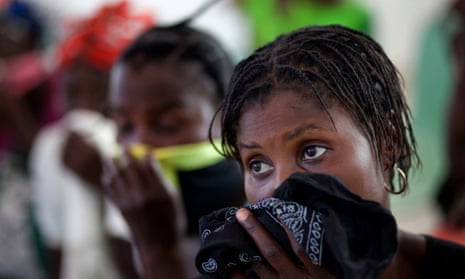Victims of the 2010 cholera outbreak in Haiti, which killed at least 10,000 people and infected hundreds of thousands more, are petitioning the US supreme court on Tuesday to hold the UN accountable for having brought the disease to the stricken country.
The nine supreme court justices will meet in conference to discuss whether to hear Laventure v UN as one of their cases of the new term. The petition goes to the heart of the question: should the world body be answerable in domestic courts for the harm it causes people it is there to serve?
The UN has admitted that cholera was introduced to Haiti by peacekeepers in 2010 after about 1,000 troops were redeployed from Nepal to help in emergency work following a devastating earthquake. Basic health measures that could have been taken to prevent the transfer of the disease at the cost to the UN of only $2,000 were not taken, and instead raw sewage from the peackekeepers’ camps was dumped directly into rivers from which thousands of Haitians routinely drew water for cooking and drinking.
A leaked report carried out by the UN itself a month after the initial outbreak of cholera found serious sanitation flaws in the Haiti peacekeeping mission. Yet for six years the world body continued to deny it had anything to do with the health catastrophe.
Crucially, the UN continues to reject any requests for compensation from the hundreds of thousands of Haitian victims. It insists that it has total immunity from such claims relating to the harmful impact caused by its staff carrying out routine business.
Now the US supreme court is being asked to consider the issue, and specifically whether the UN should be liable for the cholera disaster through domestic American courts. The issue is highly sensitive within the US, given that the UN is headquartered in New York where the annual general assembly session has just been held, and given the large number of Haitians who live in America.
The latest official figures, widely assumed to be understatements, put the number of dead in Haiti from cholera at 9,792 with a total of 819,995 suspected cases.
Three thousand American and Haitian citizens harmed by the cholera epidemic are listed in the complaint before the supreme court. The lead plaintiff, Marie Laventure, is a nurse living in Atlanta. She has three siblings also in the US, and eight siblings still in Haiti.
Laventure’s father and stepmother died of cholera in 2012, leaving the siblings under the care of the elder children struggling to fend for themselves. “Like so many others – in Haiti and the US as well – my family has suffered greatly because of the UN’s actions,” Laventure told the Guardian.
“Justice demands UN accountability. That is why we are asking the US supreme court to uphold the promise the UN made when it put aside immunity and agreed to be liable in cases like ours.”
The New York-based lawyer representing the victims, James Haggerty, pointed to precedent set in 1996 when the UN had accepted liability for the damage done by its peacekeepers in the regular performance of their duties. Exceptions were made such as the fallout of combat and actions required as part of operational necessity, but the principle of accountability was acknowledged.
Despite such precedent, the UN continues to put its efforts into health programs to fight the Haitian epidemic while denying any liability to the victims. “As it stands now, the UN can walk away from even those agreements it has made that it is liable. If words are to have any meaning, they should apply to the UN too,” Haggerty said.
The attorney added that immunity enabled a culture within the UN in which mishaps were more likely to happen. “The cholera epidemic happened because the UN felt it was never going to be liable and therefore failed to take basic steps to prevent it. Any time an organization feels it can never be held accountable, that’s when mistakes happen, corners are cut and things are done that are negligent or worse.”
